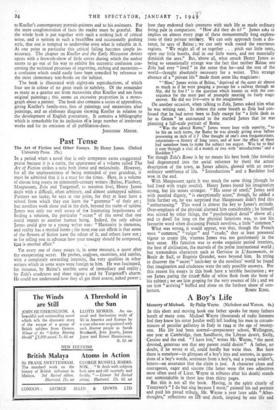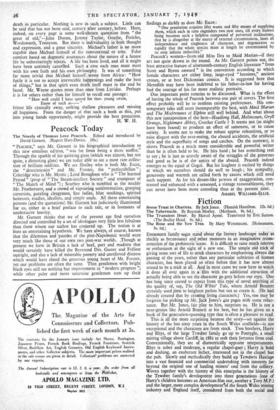A Boy's Life
Memory of Michael. By Philip Wayne. (Nicholson and Watson. 6s.)
IN this short and moving book one father speaks for many fathers bereft of many sons. Michael Wayne (thousands of radio listeners feel they know his sister Jenifer well) fell leading his men in circum- stances of peculiar gallantry in Italy in 1944 at the age of twenty- one. His life had been normal—preparatory school, Wellington, one year at Cambridge, then Sandhurst, the Libyan desert, Sicily, Cassino and the end. " I haie lost," writes Mr. Wayne, " the most devoted, generous son that any parent could .desire." A father, no doubt, if he wrote at all, could hardly but write thus. But here there is somehow—in glimpses of a boy's joys and sorrows, in quota- tions of a boy's words, sentences from a boy's, and a young soldier's, letters—an assurance that the claim is just. A character clean and courageotis, eager and sincere (the latter were the two adjectives most often used of Lieut. Wayne in tributes after his death) stands out unmistakable in these less than thirty pages. But this is not all the book. Having, in the spirit clearly of Tennyson's " I do but sing because I must," painted his sad portrait and paid his proud tributg, Mr. Wayne a year later adds "After- thoughts,". reflections on IRE,,and death, inspired by one life and death in particular. Nothing is new in such a subject. Little can be said that has not been said, century after century, before. Here, indeed, on every page is some well-chosen quotation- from " the great of old,"—John Donne, Jeremy Taylor, Goethe, Pericles, Wordsworth, Tennyson. But there is individuality in both thought and expression, and a great sincerity. Michael's father is no more capable then Michael himself of the conventional or trite. False comfort based on dogmatic assurances about the nature of a future life he unhesitatingly rejects. A life has been lived, and all it might have been untimely cancelled. Such a case each man must meet with his own faith and his own philosophy. It was of something, far more trivial that Michael himself wrote from Africa: "How futile it is not to accept irrevocable happenings and make the best of things," but in that spirit even death itself must in the end be faced. Mr. Wayne quotes more than once from Lycidas. Perhaps it is for others rather than for himself to recall one passage: " How well could I have spared for thee. young swain,
Enow of such as— " fritter life cynically away, seeking shallow pleasures and • missing all happiness. From the danger of that such a book as this, put into young hands opportunely, might provide the best protection. H. W. H.







































 Previous page
Previous page